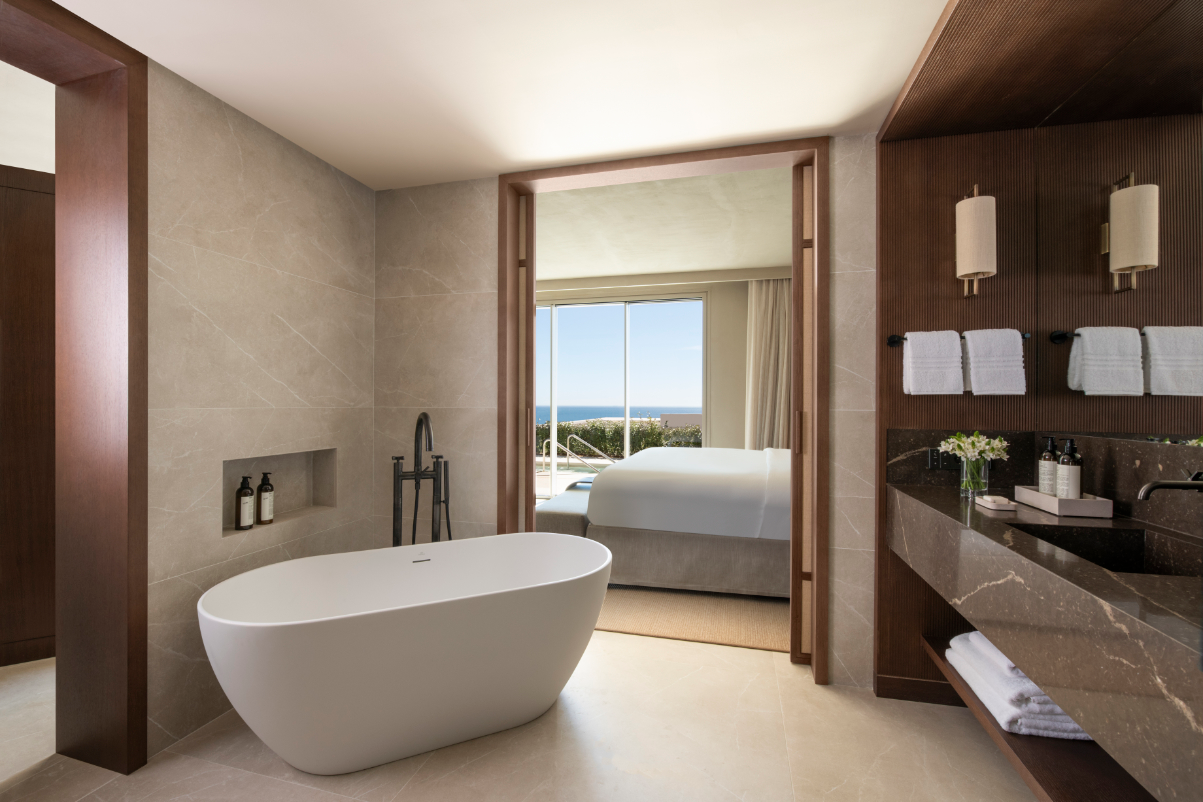Why This Hybrid Hospitality Brand Ripped Out Its Tech Stack
Skift Take

Travel Tech Briefing
Editor’s Note: Exclusive reporting on technology’s impact on the travel industry, delivered every Thursday. The briefing will guide executives as they decide if their companies should “build, buy, or partner” to stay ahead."The Hotel of the Future Is Everything to Everyone" was one of Skift's Travel Megatrends in 2018, and the concept has only grown in popularity since. "Hybrid hospitality" is a common name, though some people call it mixed-use, or blended, hospitality.
- A hybrid hospitality company blurs boundaries rather than focuses on a specialty. It offers a mix of short- and long-term leisure and business stays along with amenities for co-working, meetings and events, and wellness.
- The idea gained traction in the pandemic as hotels eyed remote workers as a revenue source. Hybrid hospitality startups like Selina seem to thrive by appealing to distributed workforces and digital nomads.
The Student Hotel (TSH), based in Amsterdam, illustrates hybrid hospitality — and the tech challenges of supporting the vision.
- The Student Hotel, founded in 2012, has its roots in purpose-built student accommodation.
- When school's out, it re-sells rooms to transient travelers.
- The asset-heavy company owns and operates all its locations in 13 European cities. It has 15 locations open, will open three more this year, and seven more by 2025.
- Its flagship location, The Student Hotel Amsterdam City, offers student housing, flex-desk space, dedicated offices, mini classrooms, an Olympic-size lap pool, a full-featured gym, an auditorium, and a restaurant.
Many hospitality brands might learn a trick or two from The Student Hotel, such as:
- How to make the most efficient use of their spaces,
- How to re-sell and cross-sell access to the same spaces via different channels and packages,
- And how to build a tech stack to support those functions.
I spoke with Mark Liversidge, chief digital, technology, and experience officer, to learn more.
- Liversidge has had a varied career. He was a top executive at a telecom and a chief marketing officer for Asia Pacific at Hilton Worldwide.
- He joined The Student Hotel in 2019.
- "My mandate has been to transform the tech stack to make it an enabler of the business strategy," Liversidge said.
The Student Hotel's tech stack was a mess. Liversidge has been ripping and replacing systems.
- "The company inherited the technology for running things as a patchwork over a series of acquisitions of properties," Liversidge said. "If anything, the technology was disabling us from meeting our goals. You could be a guest in our hotel and come down to get a drink, and our restaurant's system wouldn't recognize you — making you pay for your meal a la carte."
- The company used a property management system for its hotel offering and a proprietary management system for its student accommodation.
- "Nevermind wanting to bundle products and services together," Liversidge said. "You couldn't get the machines to talk to each other."
- Things degraded in savviness from there to a meetings business run manually by a phone hotline and an Excel spreadsheet.
The big idea that The Student Hotel came up with is to think of all its physical space for sale on dimensions of both "space" and "time."
- One foundational idea is that any unit of space can be re-used and re-marketed at different times of the day. That idea may sound simple, but vendors don't configure most computer systems to let companies handle and sell space in that way.
- "We needed technology to allow us to run a space as different products and make it bookable through different mechanisms and stay in compliance with different regulations while harmonized in one tech environment," Liversidge said.
- "Our old system made us pre-determine and lock-in allocations of space by product," Liversidge said. "Any change to that allocation involved a manual analysis and intervention. So we were super-slow at being able to act on opportunities."
First, let's talk about space.
- Think of a venue, and then imagine dividing it into cubes. How can you derive profitable revenue for each of those square meter cubes through perpetual, optimized full occupancy?
Now let's talk about time.
- How can you re-purpose a square meter cube across different timespans as different products? For example, you could sell the accommodation for a semester's length via a block booking. Or you could sell it as one-night stays to a transient leisure traveler.
- While the idea sounds simple, today's off-the-shelf computer systems typically don't offer this framework.
When space and time come together, things get complicated. But the cost efficiencies and profit potential also become significant.
- "In our workspace, we used to have a study area for resident students and a separate co-working space," Liversidge said. "But most of the students studied at night while the co-working happened in the day. We realized we just needed to create one space for what is essentially the same customer behavior."
- "The challenge was that students booked our flex-desk access as a product with different rules from how business people booked co-working space," Liversidge said. "Students got flex-desk access as part of booking their residence, while a business might block-book the co-working space. So how do you run that through a singular system?"
The Student Hotel is structuring its tech system with "per minute" as the smallest time bloc. The system can sell a space up to a year ahead.
- In theory, The Student Hotel could offer a space for 10 hours at night for a transient hotel guest. Then, after housekeeping cleaned it, the brand could sell the same space as a work or study space for several daytime hours. Or it could bundle gym and pool access with a hotel stay as an upsell — though perhaps only during specific hours.
- "We also want the option to be able to optimize profit in response to demand shifts," Liversidge said.
- He gave the example of dialing back on some of those extended stays that yield lower-per-night revenue and flipping them to more immediate transient leisure opportunities if demand trends dictated that would be more profitable.
When designing the tech stack, Liversidge found it helpful to think about The Student Hotel's pillars.
- It has an accommodation product for student housing and transient leisure.
- It has a workspace product that ranges from office-as-a-service to a flex-desk subscription.
- It has lifestyle product, which includes retail, wellness, gyms, and food-and-beverage concepts.
- "The pillars are wrapped around with community, which means meetings-and-events, arts programming, and continuing education programs," Liversidge said.
Liversidge then looked to the market to find tools that could handle an interplay between those functions. It uses several vendors. To be sure, some other vendors could have addressed these functions, too.
- The Student Hotel is working with Mews to design its tech stack so that the system can run any given space across different products for different time spans. That work with Mews as a single operational management system, and the final decommissioning of legacy systems, is expected to wrap up around August 2022.
- The hospitality brand is working with pricing vendor Pace Revenue to learn how to set rates optimally.
- The Student Hotel will deploy through the end of next year HP's Aruba hardware to take advantage of the internet of things to make it less of a manual process to change over space usage.
- "We want to use automation to be able to tell our staff when to clean and re-purpose a space and to trigger an offer proposition out to a relevant audience," Liversidge said. "If a meeting room is vacant, for instance, we could offer it ad hoc to residents or guests for booking on a free or fee-based basis."
- The company plans to rely more on Salesforce to manage its customer relationship data.
- "Lastly, we're swapping out all of our general ledger, treasury, and human resources systems to a fintech layer that's orientated with the new operational environment, hopefully by September," Liversidge said.
It won't be until later this year that the results will determine whether the tech expenditure has boosted incremental profit margin.
- But Liversidge is happy that, by this summer, his overall tech stack will make a connection between the brand's revenue optimization system and its inventory management system.
- "We'll be able to sell our primary product to you at a lower price than the next person pays, predicated on having the intelligence to know that your overall spend across our services and additive experiences will be greater," Liversidge said.
- All of this tech work will help support a savvier use of subscription models.
One big caveat: The Student Hotel's hybrid hospitality approach isn't for everyone, and it's not a sure thing that the company's tech investment will deliver the expected return on investment.
But it's educational to think of The Student Hotel's model, given that more travel companies see a blurring of their portfolios across categories such as extended stay and co-working.
I always read tips and feedback. Reach me at so@skift.com or sean.f.oneill@protonmail.com, or ask for my Signal account.





